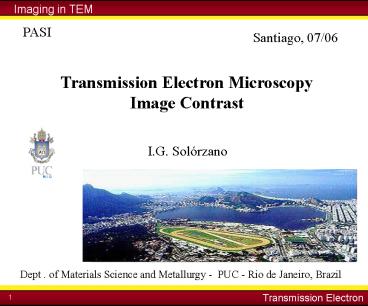Transmission Electron Microscopy Image Contrast - PowerPoint PPT Presentation
1 / 34
Title: Transmission Electron Microscopy Image Contrast
1
PASI
Santiago, 07/06
Transmission Electron Microscopy Image Contrast
I.G. Solórzano
Dept . of Materials Science and Metallurgy - PUC
- Rio de Janeiro, Brazil
2
After D.B. Williams and C.B. Carter Plenum Press
1996 A note on wording
Change in intensity
Contrast
Beware of digital images or good darkroom
technicians
3
STEM is a serial technique
Some special features (e.g., Z contrast)
Note comparison to TEM
4
Mass-Thickness contrast
Tricky because we are talking about several
concepts at once.
5
Shadowed
Mass-Thickness contrast
Shadow with Au/Pd, Al, Pt, Cr, etc
C film
Thickness contrast
Shadows are dark !
6
Staining is much more important in Biology
Beware of safety wjen using OsO4
7
Another reason for TEM prefered over STEM
Image processing is now easy and TEM has better
resolution - Why?
8
TEM DF versus STEM ADF
Thinkwhy there is a difference
TEM DF. Better resolution
STEM ADF. More signal less noise
9
C replica
C replica plus shadowing
Extraction replica of Cr-Mo steel
10
Z contrast of PT atoms or groups of atoms
Why is this STEM better? .... FEG
11
The Principle of HAADF
Current research topic
12
TEM BF
Z contrast
Bi-implanted Si
Z contrast
13
High Resolution
TEM
HAADF
How do we interpret this?
14
2-beam DPs
Beware when you read about CDF
15
Which is BF which is DF ?
16
Relate image DP
Tilting the beam. Here, the specimen is not moving
17
Regular STEM
STEM with smaller ?
TEM
18
(No Transcript)
19
For 2-beam conditions BF DF images are
complementary
Thickness Contours
Thickness Fringes
20
(No Transcript)
21
Two thickness effects
22
Why contours? ... Like a map but both sides vary!
23
Howie Whelan equations
24
(No Transcript)
25
When the surfaces is faceted This is what we
actually calculate
26
BENDING
Really important Learn this
Much to think about with this figure
27
ZAPs
Example of using the schematic
Bend contour
Bend contour
How can you recognise them?
28
c
f
e
d
- Bend contours AA and bend centres in aluminium
with associated SADP inset - 100, (c) 110, (d) 112, (e) 111, (F)
114, (g) 003
29
Identifying bend contours
Use displacement-aperture DF images
Notice
Then use the schematic
30
Using the 90 wedge
Why do the fringes disappear?
?g was due to k(1) - k (2). We have lost a k.
Why the change? Ans ?g
Be careful. Look at the edge.
OK
31
(No Transcript)
32
(No Transcript)
33
300kV
100kV
Would you be able to tell which is which?
34
Note the arrows
Bending and thickness can occur at the same time!
cknowledgements
Acknowledgements Illustrations from the book ,
Transmisison Electron Microscopy by D.B.
Williams ab C.B. Carter (Plenum Press, 1996)































